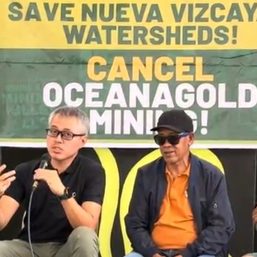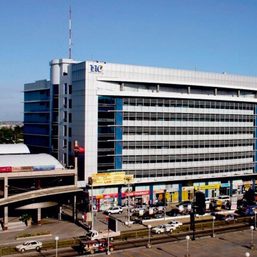SUMMARY
This is AI generated summarization, which may have errors. For context, always refer to the full article.

PAMPANGA, Philippines – In an upland village of Kasibu town in the province of Nueva Vizcaya, teacher Noel Sadinas noticed the unpleasant smell and stray dogs coming from the dumpsite area.
Sadinas, who was then newly transferred from another school, reached out to the town’s municipal environment and natural resources office (MENRO) for an awareness campaign partnership program on the proper garbage disposal. Segregation and recycling marked the first step of the Project Application (Applying Pro-Environment Practices and Local Ideas, a Collective Advocacy Towards an Intimate Care for Our Nature).
Started in 2018, Project Application aimed at transforming the open dumpsite located in the school’s backyard into an indigenous peoples’ village and a demonstration farm that provides learning opportunities and safe local farming practices in the community.

“When I was transferred here to Kongkong from another school, there was a dumpsite within the school premises that was causing distractions during the teaching and learning process because it was open and had no fence. We didn’t know if even the community was using it as a dumping site. We, together with the school staff and principal, decided to transform it into an indigenous peoples’ village and, at the same time, an organic demo-farm village,” Sadinas told Rappler.
“Our main focus back then was on how to remove the trash from the area. That was the first step we took. So, we partnered with MENRO for an educational campaign on proper waste segregation and recycling. As the trash gradually disappeared, we turned it into an organic demo farm.”
Local government support
According to forester Esthie Olli, the community used to have a low awareness of proper disposal and waste management, which resulted in open dumping.
Olli noted that their municipality prohibits open dumping through its Municipal Solid Waste Management Ordinance as well as the Republic Act 9003 or the Ecological Solid Waste Management Act of 2000.
Subsequently, the local government of Kasibu entered a memorandum of agreement with Kongkong Elementary School in 2019 to also express their support for the project.
“They had a low level of awareness back then regarding proper disposal and management of waste, which is why there was open dumping. Trash, wrappers, and plastic were being thrown there. They conducted a symposium, and that was one of the things we noticed. The office and the school discussed that it should be converted,” said Olli in an interview with Rappler in a June interview.
MENRO provided free seedlings, worms for compost, and held a symposium for the students on how to segregate and recycle, and talked about the effects of the watershed through the school’s adopt-a-creek program and clean-up drive.
“We also provided the provision of materials such as seedlings, fruit-bearing trees, and composting worms, which were more on the technical side. They tapped us as speakers in the symposium for the children. We also taught the students how composting and recycling activities work. We also helped them understand the impact of the watershed. They have a river there, and they also have an adopt-a-creek program and clean-up drive for the river,” he said.

The project won the support of the local government of Kasibu and the parent-teachers association and provided a total of P95,700 to improve and transform the dumpsite area.
About 363 students and 15 teachers comprise Kongkong Elementary School. Together with the parents of the students, everyone helped in the transformation of the dumpsite, Sadinas said.
IP village
Barangay Kongkong is a small village in Nueva Vizcaya where the majority of the people in its community are Ilocanos. About 30% of its population represent indigenous peoples’ groups which include Kalanguya, Ibaloi, Bugkalot, Tuwali, and Ayangan.
The IP village was constructed with six houses to represent each of the groups in their community where IP elders share local practices in organic farming with students, teachers, and parents.
Through the elders of the indigenous peoples’ old customary traditions of farming, Sadinas said it reinforced their project’s sustainability.
Among the IP elders, Domie Minte presented ways how to make organic fertilizer with banana stalks and leaves, hay, vegetable, and fruit waste products combined with earthworms for faster decomposition, which is also called “vermiculture.” Other IP elders demonstrated how to make organic insecticides.
Exchange program
Sadinas was encouraged to improve the project through his experience in the teachers’ exchange program.
In 2019, he traveled to South Korea through a partnership program between the Department of Education, United the Nations Educational, Scientific and Cultural Organization (UNESCO) Asia Pacific Center of Education for International Understanding, and the Ministry of Education of South Korea.
He shared his practice as a teacher for three months and used his time to explore the country and its students where he discovered Korea’s culture and love for organic food.
He said, “I had the opportunity to participate in the 2019 Korea-Philippines teachers’ exchange program in South Korea for three months. I taught there, and then I saw the Koreans’ love for organic food. That became my motivation to intensify the project we started.”
With the success of Project Application, 70 out of 72 undernourished students have reached healthy nourishment through their school-based feeding program from its organic demo farm.
The demo farm, Sadinas said, became the source of organic vegetables for the feeding program to address hunger and undernourishment in its community.

“It served as a laboratory of learning for 21st-century learners, especially in technology and livelihood education, particularly agriculture in Grades 4, 5, and 6. This functional demo farm also attracted stakeholders from agencies, NGOs, and private entities and individuals to show support as part of the community collaboration,” he said.
Sadinas said one of the “secret ingredients” which contributed to the success of the project was its continuity, especially during the transition period of the school’s administration to the new principal, Jomar Calibuso.
The teachers, students, and parents applied the knowledge and skills they had gained from the project and established their organic gardens at home. This resulted in sustainable farming among all teachers and most of the households in the town of Kasibu.
Shortlisted for prize
Through Project Application, Kongkong Elementary School was shortlisted among the top 10 for the World’s Best School Prize for Community Collaboration, the world’s most prestigious education prize for a school’s pivotal role in developing the next generation of learners for their contribution to society’s progress amid the COVID-19 pandemic.
Vikas Pota, founder of London-based T4 Education, and the World’s Best School Prizes lauded the Kongkong Elementary School and Muntinlupa National High School on being shortlisted among the Top 10 for the World’s Best School Prizes in 2023.
Pota said, “The schools shortlisted for the World’s Best School Prizes, no matter where they can be found or what they teach, all have one thing in common. They all have a strong school culture. Their leaders know how to attract and motivate exceptional educators, inspire change, and build excellent teaching and learning environments. Schools across the globe will learn from the story of these trailblazing Philippine institutions and the culture they have cultivated.” – Rappler.com
Add a comment
How does this make you feel?
![[Newspoint] Willful indifference](https://www.rappler.com/tachyon/2024/05/np-willful-indifference-05032024.jpg?resize=257%2C257&crop=270px%2C0px%2C720px%2C720px)




![[OPINYON] Thesis for sale](https://www.rappler.com/tachyon/2024/06/tl-thesis-for-sale-1.jpg?resize=257%2C257&crop_strategy=attention)
![[EDITORIAL] Post-Sara Duterte resignation: Ang trahedya at ang pag-asa sa edukasyon](https://www.rappler.com/tachyon/2024/06/animated-sara-duterte-resigns-as-deped-chief-carousel.jpg?resize=257%2C257&crop_strategy=attention)
![[The Slingshot] Blunders and mess Sara left behind at DepEd](https://www.rappler.com/tachyon/2024/06/TL-Sara-Duterte-DepEd-June-24-2024.jpg?resize=257%2C257&crop_strategy=attention)















![[OPINION] Academic dishonesty is pervasive](https://www.rappler.com/tachyon/2024/05/tl-academe-dishonesty.jpg?resize=257%2C257&crop_strategy=attention)

There are no comments yet. Add your comment to start the conversation.